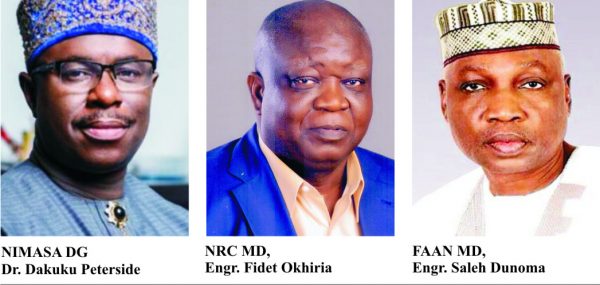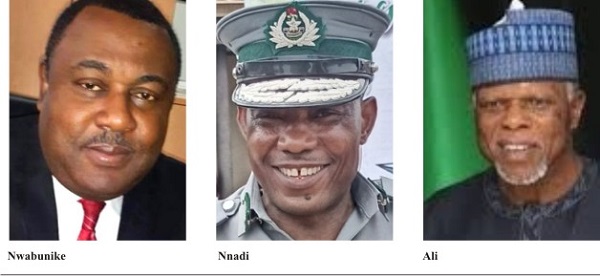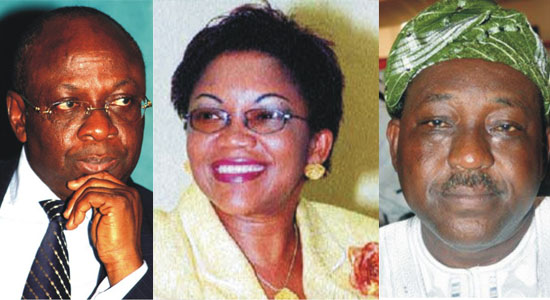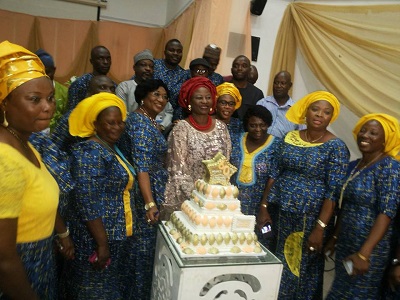2017: Rating Government Agencies In The Transport Sector 2
Last week we presented the scorecard of some transport agencies based on their performance in 2017 with regards to their core functions. The appraisal continues here. The year 2017 was one loaded with activities, issues and scandals in the Nigerian Transportation sector; but what did these agencies achieve? Find Out!
For the grading system: A =90-100%, B+ = 80-89%, B =70-79%, C+ =60-69%, C =50-59%, D =40-49% and E = 30-39%, F = 0-30%. Enjoy it:
Nigerian Maritime Administration and Safety Agency (NIMASA)
NIMASA is the agency saddled with the onus of maritime administration and safety; to pursue the development of shipping and regulatory matters relating to merchant shipping and seafarers.
The Director General of the agency, Dr. Dakuku Peterside raised the dyke early, during a world press conference in Nigeria; but how did NIMASA fare in 2017? To ascertain this, we look at NIMASA’s core functions unbundled into ten (10) parts each carries 10 points:
Administration and regulation of shipping licences: The fact that none of the Nigerian Liquefied Natural Gas (NLNG)vessels carries Nigeria’s flag goes a long way to explain NIMASA’s failure in this role. If you think the issues with NLNG predated 2017, how about the Engina vessel which came in 2017? Engina’s registration done in Panama. A private individual who wants to register a fishing vessel at NIMASA would spend more than a year and come out more than ten certificates from the agency; not to mention the complexity and extortion. NIMASA did nothing to change this trend in 2017. It is easier, faster and more convenient to register your vessel in Cotonou than Nigeria. Score = 2/10
Administration, Regulation and Certification of Seafarers: This is a complicated issue. Lack of Nigerian owned/ flagged vessels mean no opportunities for seafarers to obtain the requisite seatime and become employable seafarers. Therefore the agency had little to do in this regard. NIMASA has begun to send cadets all around the world for seatime and its performance of this function is expected to improve in 2018 but in 2017 the agency was poor. Score = 3/10
Establishment of Maritime Training and Safety Standards/ Regulation of safety of shipping as regards the construction of ships and navigation: The truth is there are no competent officers to play this role so it was jettisoned.Score = 0/10
Maritime Search and Rescue Services and Providing direction to ensure compliance with vessels security measures: Search and rescue operations in the country hasn’t improved. You may argue that there were no casualties to warrant proof of this but there are no equipments for this operation. Those acquired for billions of naira are abandoned at the NIMASA Research Institute, visit Kirikiri. On the provision of direction to ensure security measures NIMASA was below average. Score = 3/10
Provide Maritime Security: NIMASA made commendable efforts here as the nation’s territorial waters were relatively peaceful in 2017. However, the success in this function should be shared with the Nigerian Navy, and other security agencies. Score = 5/10
Enhance and administer the provision of Cabotage Act 2003/ Control and prevent Maritime Pollution: Cabotage Act of 2003 is dead, or to put it mildly; the Act is asleep. All the benefits outlined in the Act are yet to manifest as a result of multiple challenges that predate 2017. NIMASA did nothing in 2017 to change the status-quo. Nothing significant was recorded in the area of maritime pollution. Score = 4/10
Develop and implement policies and programs, which will facilitate the growth of local capacity in ownership, manning and construction of ships and other maritime infrastructure: Not one programme/ policy was organized to fulfil this function in 2017. Score = 0/10
Perform Port and Flag State duties: This function was characterized by poor service delivery throughout 2017. Let’s hope for a change this year. Score = 4/10
IMO Conventions, Elections:
Despite the exorbitant AAMA spending, the nation failed to get into the category C of the IMO Council a problem which led Ship Owners Association of Nigeria (SOAN) to fault the NIMASA Director General. The event led Nigeria to emerge president with Dakuku’s position as the President of the Association tipped to give Nigeria an edge in the next International Maritime Organization (IMO) Council elections in November. Yet, Nigeria lost and will lose again if the election holds today because the problems are yet to be addressed. Dear Dakuku, it wasn’t lobbying that cost us the IMO Council seat.
The Minister of Transportation, Hon. Rotimi Amaechi also distanced himself from the NIMASA boss at a SOAN event when he lamented that Dakuku refused to implement in full, the recommendations of a committee setup by the Minister to reposition the agency. NIMASA received IMO commendations for following its conventions but the agency is yet to soar on the massive maritime advantages and cargo traffic in the nation. Score = 2/10.
Carry our Air and Coastal Surveillance: NIMASAperformed well here but it was probably as a result of the collaboration between the agency, the Nigerian Navy and the Nigerian Airforce.Score = 5/10
Conclusion:
NIMASA doused the tension of the failure at the IMO Council elections at the tail end of the year, awarding automatic scholarship to thirty-three (33) first-class NSDP cadets who successfully concluded their seatime training with distinctions. NIMASA also partnered with Nigerian Ship-owners Association (NISA) at the expense of SOAN for the event and NISA members were so inspired that they doled-out over N3million cash gifts to the NSDP cadets. This scenario has been described as an ‘arrangee’ by some maritime sector veterans who posit that NIMASA may have funded these donations. 2018 is a new year and a lot is expected of NIMASA and its amiable Director General, Dr. Dakuku Peterside.
Grade F (28%)
Nigeria Railway Corporation (NRC)
The Nigeria Railway Corporation (NRC) is one of the critical government institutions that provides transport services in the country. NRC cannot be correctly x-rayed without considering the effects of the Federal Ministry of Transportation’s influence in 2017.
NRC got more attention from Federal Government in year 2017 with several financial commitments, reforms and innovative policies initiated towards its improvement. The federal ministry of transportation began moves to concession the narrow gauge to General Electric (GE), an American consortium.
We rate NRC based on five of its statutory functions with twenty (20) marks for each.
Manage and operate the railway for carriage of passengers and goods:
This is in terms of carriage of passengers and goods in a manner that will offer full value for money. In year 2017, the NRC management strove to ensure improvement and efficiency in services to the freight owners and the teeming commuting publics
NRC through its Lagos District recorded successes in freight patronage and improvements in service delivery on both freight and passengers trains as it impressively helped in the decongestion of Apapa in the face of the ongoing road construction that has caused serious gridlock. Lagos district commenced a shuttle service between Apapa and Alago meji in 2017.
NRC entered talks with Total and other major oil marketers in year 2017 to see to the effective use of over forty (40) tank wagons that had been less utilized ever since its purchase in 2012.
However, MMS Plus during an investigative tour at Ebute-Meta in 2017 observed the decay and irregularities on the trains. The Mass Transit Trains (MTT) and locomotives are old and congested. They are very dirty and activities on the train weren’t regulated that everywhere was littered with faeces. Yet, so many people boarded the trains without paying coupled with the corruption of Checkers and Task force officials on the train.
Although, NRC tried to check these abnormalities and corruption on the train by changing ticketing modes and checkers regularly, and also the enforcement of disciplinary actions on the guilty, for instance, officers caught engaging in racketeering in Kaduna station were dismissed, but the act still persisted. Based on this NRC scores 12/20
Meet cost of operation; improve market share and quality of services;
Despite huge patronage, NRC still cannot generate enough revenue to meet its cost of operation as bulk of its expenses and major finance still comes from the Federal Government.
The Federal Government pays workers salaries and other related expenses. This has led to major discouragement to the government because it spends more than it generates from NRC.
NRC tried to increase its quality of services in 2017. The Abuja-Kaduna train was of qualitative services coupled with other customers’ service innovations. A website was designed for booking of trains from any location within the country. Score = 4/20
Direct and control of any expansion or extension of the railway and the construction of new railway:
The Railway System has been undergoing some rehabilitation and modernization with the full political and financial support of the Federal Government through the Federal Ministry of Transport.
Equally, new railway lines are being constructed in standard gauge (1435mm). These include: Ajaokuta – Warri line of 277km; Kaduna – Abuja (Idu) line of 186 km. while the scope of work for Lagos – Ibadan segment was marked to be completed by 2017 and old ones are receiving rehabilitation touch with the motive of adding modern outlook to its operations and management and also to improve intra and inter-city railway linkages and services.
The rehabilitation of the railway system includes track spot renewal of Lagos to Kano and Maiduguri to Port-Harcourt, supply of 25 new locomotive engines from Brazil, South America to boost the existing motive power base of the Corporation, upgrading of the signaling and telecommunication system from manual to semi automatic, as well as rehabilitation of Carriage and Wagon Workshops, re-equipping the workshops, supply of service support (spare part consumables), strategic rebranding of the Corporation, rehabilitation of stations and marshalling yards, inter alia.
There are templates for technology transfer and most of the designs are done by indigenous engineers. Score = 9/20
Ensure safety of operations and maximum efficiency;
There were no major records of accidents or train derailments in 2017. Security was prioritized as police officers were regularly stationed on the trains to curtail criminal activities. NRC had Memorandum of Understanding (MoU) with St. Johns ambulance services to cater for emergencies.
Score = 10/20
Meet social responsibility in a manner that will meet the requirements of rail users, trade, commerce, industry and general public:
In terms of social responsibility, NRC cannot still meet the requirements of rail users, trade, commerce, and others in 2017. This has been blamed on capacity constraints and neglect by past governments.
NRC doesn’t take to time schedule for trains and there were several delays and even cancellations without any tangible excuse or explanation in 2017. Most customers, often get stranded at the stations waiting endlessly for train after purchasing tickets.
It is incontrovertible that the DMU which is the standard coach and locomotive is very expensive and cannot be accessed by the peasants.
Nothing tangible was recorded in the areas of corporate social responsibilities.
The NRC headquarters lacked proper public relations skills. It operated poor customers’ services that characterized the polity as there was a particular complain of missing goods since the beginning of the year which wasn’t given the desired attention.
Score = 2/20
Conclusion
The purchase of new Diesel Multiple Units (DMU) locomotives and other modern facilities compliments government’s disposition to the revitalization of Railway Transport system in Nigeria. However, low capacity, washouts during heavy downpours and poor workers’ Welfare still remains a major challenge in NRC as it still cannot meet up with demands in both passengers and freight services.
The concession idea still appears utopian as it didn’t kick start throughout the year 2017 despite the transport minister, Rotimi Amaechi’s promise even as railway workers and other stakeholders expressed skepticism in the entire process.
Nonetheless, the railway transport system was more popular in 2017 because of consistency in activities in the sector. The Nigerian Railway, having completed its phases of rehabilitation of its vast assets, is expected to play an increasingly pivotal role in the economic and social developments of the country in 2018.
Grade E (37%)
Federal Airport Authority of Nigeria (FAAN)
FAAN is a service organization statutorily charged to manage all commercial airports in Nigeria and provides service to both passenger and cargo airlines. It is generally, to create conditions for the development in the most economic and efficient manner of air transport and the services connected with it as well as provide security for passengers and airlines and aircraft around the airport.
In 2017, the Federal Airports Authority of Nigeria (FAAN), through the aviation Ministry successfully rehabilitated the Nnamdi Azikiwe Airport, Abuja, while the Kaduna Airport was upgraded to international standard to serve as an alternate Airport to Abuja. This is only two out of the 22 airports it manages. So in this regard FAAN got 3/25
The Nnamdi Azikiwe International Airport, Abuja was closed to traffic for six weeks between March and April, and the federal government was able to upgrade the Kaduna Airport to international status and it became alternative to the Abuja airport. Due to the importance of the Abuja Airport, to the national life, government kept its promise and the job on the 3.6 kilometre runway was delivered as promised. The runway, was actually constructed in 1982 and was meant to last for 20 years, but had been in use for 35 years, without major repair and proper maintenance.
The Murtala Muhammadu International Airport, Lagos and the Nnamdi Azikiwe International Airport, Abuja, all got the Nigerian Civil Aviation Authority (NCAA) certification for safety and security. This is the first time any airport in Nigeria, and indeed, the entire West African sub -region, would be certified.
Therefore in this regard FAAN scored only 3/25.
FAAN also had two of the airports it manages certified by NCAA in lined with the International Civil Aviation Organisation (ICAO) recommended guidelines. The airports are the Lagos and Abuja Airports. This is also two airports out of 22 airports. This nets the agency 5/25.
However, most of the airports that FAAN manages remained in a state of disrepay with cracked runways and the terminals in shambles. Examples are the Port Harcourt Airport and the Enugu Airports which need in dept rehabilitation both at the runway and within the terminal buildings.
On the provision of services to airlines and passengers, the airport authority scored poorly also. For instance, there were several incidences of power outages especially at the Murtala Muhammed International Airport, Lagos, which impacted negatively on flight operations and passenger welfare.
Also, on April 12, a fire which started at about 8.20 a.m. affected some offices at the headquarters of FAAN at the Murtala Muhammed Airport, Lagos. The offices affected included the Audit, Public Affairs and Commercial Departments and an investigative panel was constituted by the Managing Director of FAAN, Mr. Saleh Dunoma. Till date, the management of FAAN has yet to make the findings of the investigation public.
So in this regard the airport authority is scored 7/25
In addition, FAAN ended the year with negative reports involving a breach in security at the airside where there were reports of poaching of luggage from light aircraft in motion. Security in civil aviation is very critical and it is a huge minus for the authority when unauthorized individuals are allowed to access restricted areas. Therefore the airport got 5/25
Despite scoring some points in some areas the airport operator as usual performed woefully in relevant. However, the fact that there was no major accident or incident in the industry last year is something positive for the entire industry as a whole, so in all FAAN got 23%.
Grade F (23%)
Nigerian Airspace Management Agency (NAMA)
NAMA is an Air Navigation Service Provider with mandate to manage the Nigerian Airspace to a level consistent with the requirements of the ICAO SARPs and make it rank among the safest in the AFI region indeed, the world over.
Thus the Nigerian Airspace Management Agency (NAMA) has the responsibilities to continue to provide safe and functional air navigation services that will meet international standards; to increase Air Traffic Management (ATM) capacity in order to manage the increasing air traffic volume and simultaneously reduce delays, to enhance service quality; To reduce cost for airspace users.
The agency achieved some milestone in the development of manpower with the training of core aviation professionals within the agency.
However the major problem of flight disruptions and cancellations and delays during the harmattan period had remained a lingering one in the industry year in year out. This is at variance with one of its core responsibilities to simultaneously reduce delays and enhance service quality, which nets the agency 4/25.
Also analysts within the industry have complained that the agency collects high fees from the airlines for its services and also in foreign currencies even for flights within the country, while it has failed to provide the highest quality of services for the airlines. This they said remain a huge minus for the regulatory authority as well as NAMA as both have failed to provide a solution to the problem even till date, with NCAA issuing the Weather Minima warning every harmattan period, when there are navigational aids that can take care of the problem once and for all, enabling aircraft to take off and land despite the weather situation. Thus the agency failed in its core responsibility to provide safe and functional air navigation services that will meet international standards thus scoring 4 marks out of 25.
On the issue of increasing Air Traffic Management (ATM) capacity in order to manage the increasing air traffic volume, the agency performed well at least there were no incidences of aircraft colliding in the sky and there was no major aircraft accident or incident in the industry last year. So we score the agency 8/25 in this regard.
In the area of reducing cost for airlines the agency scored poorly as its inability to provide last solutions to issues of delays and cancellations is still costing airlines huge sums of money so we score the agency 4/25, and in the area of to continue to provide equipment that will meet international standards we score the agency 4/25
On this basis we score the agency with 20% in its performance for last year, and it is hoped that NAMA would this year improve in its performance by installing the needed navigational aids and equipment that will further enhance air transportation in the country.
Grade F (20%)
Only about 17% of the nation’s budget was released last year. So it would be unfair to have expected any of these agencies to perform even averagely. Watch out for the scores of other agencies like the Nigerian Institute of Transport Technology (NITT), Maritime Academy of Nigeria (MAN) Oron, National Inland Waterways Authority (NIWA), Accidents Investigation Bureau (AIB), among others next week.
Copyright MMS Plus.
All rights reserved. This material, and other digital content on this website, may not be reproduced, published, broadcast, rewritten or redistributed in whole or in part without prior express written permission from KINGS COMMUNICATIONS LIMITED.








